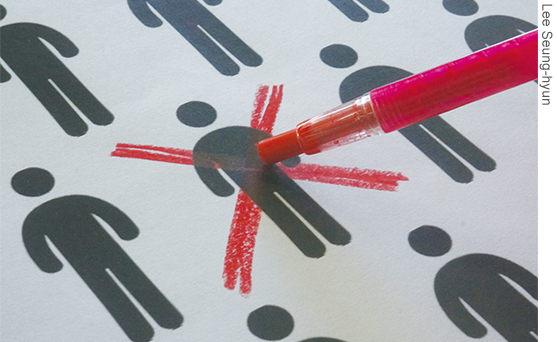The cases of influencers and celebrities getting criticized through social media is ever increasing. It is usual for people to attack them and plaster the comments into curses when they have done something offensive nowadays. This does not stop with criticism, but also involves insults, and in some cases, even threatens their position.
This kind of social atmosphere of online shaming is called “Cancel Culture.” The term “Cancel Culture” refers to a recent online phenomenon, canceling the followings of people or boycotting who have different thoughts and opinions of their own, especially when celebrities or public figures make controversial issues by saying or doing something offensive. It also means canceling somebody, removing the person's status or a workplace and destroying his or her esteem, career, or reputation.

Cancel culture has been formed around 2017, when the idea of canceling celebrities for problematic behaviors or statements became popular around the crowds. This culture was formed by Call-out Culture, which is connected with the #MeToo movement. The #MeToo is a social movement against immoral culture, that encourages people to publicize their experiences of sexual abuse or harassment by calling out their abusers, especially the powerful ones among them. It is also related to the Black Lives Matter movement (BLM).
To highlight racism, discrimination, and inequalities toward Black people, the Black community repeatedly called out the cases of Black people being killed by the police. The phrase “Cancel Culture” started from here. People started to write “You are canceled!” to point out the problems of those who discriminated or had a hate speech to the minorities depending on their race and gender.
This culture got broadened not only being applied toward the movement, but also to celebrities, influencers, and even politicians. There are some cases which were affected by cancel culture positively and negatively. J.K. Rowling is an example of cancel culture. Rowling once liked a tweet which was related with criticizing and condemning the rights of transgender people and called trans women as “men in dresses.” Rowling also wrote comments on Twitter that appeared transphobic. “Dress however you please. Call yourself whatever you like.
Sleep with any consenting adult who’ll have you. Live your best life in peace and security. But force women out of their jobs for stating that sex is real?” A lot of people commented that it was so careless and dangerous for her to write this kind of opinion publicly. People started to lash out at her saying that she should apologize for promoting harmful fundamentalism that endangers the LGBTQ society. This became serious, and crowds wrote a bunch of sharp messages to J.K. Rowling, delivering some words such as “shut up,” “Take your voice, your franchise, your presence, and be gone.”
Another example of cancel culture was at the Oscars. In 2016, a lot of members of the film industry criticized the Academy Awards and boycotted it because of the lack of diversity in the nominations. Only white actors were nominated for all 20 acting awards. This caused resentment in the public. They started to post online with the hashtag #OscarsSoWhite on social media and shamed the Awards for its lack of inclusivity. This led marginalized groups to advent and made up great works like “Get out,” “Coco,” “Black panther,” and in 2019, the awards were given to the colors, setting a record for the most nominations for black directors.
Cancel culture helps combat wrongdoings and address inequalities. It can be a way to hold people accountable, and make them consider their actions and influence. However, there are different opinions saying cancel culture just exists to attack and punish others for being offensive, and to block others’ freedom of speech. To get more varied opinions and different thoughts by individuals, The UOS Times interviewed two students. Student A thinks that cancel culture represents accountability and Student B thinks that cancel culture represents unjust punishment.
Q. What do you think of cancel culture?
Student A
“This culture makes people responsible. When people express their opinions with the lack of forethought, the public may correct them and make them think again about their actions. It may be their learning moment and it can make them realize what went wrong. Saying nothing to the people who have done or said something inappropriate is showing approval for it, so it is important to take a stand against offensive behaviors. Calling people out and making them realize their errors can be a step toward a better society.”
Student B
“Cancel culture is a sort of punishment which they do not really deserve. It is necessary to consider the meaning of the statement and the context in which it was written before criticizing it, but people usually overreact even before they figure out the truth of the situation. This can lead to ill-judged criticism and worsen situations. Also freedom of speech may have different meanings for different people and everyone has their freedom to speak what they think. Having different views among different people is natural and all types of views should be respected.”

Cancel culture, is it okay to continue? It is desirable to point out unhealthy actions in others and share their own thoughts together through social media. Engaging in debates can bring about change on some occasions and the public can help society head in a better direction. However, extreme criticism and condemnations targeting a person can cause other problems.
As Barack Obama said, “That is not activism. That is not bringing about change. If all you are doing is casting stones, you are probably not going to get that far. That is easy to do.” Calling people out and punishing them unjustly solves nothing. To keep this culture mature and to move on, the public must avoid ruthless attacks and be considerate toward others. It is essential for social media to enable productive conversations where people can exchange their opinions freely.
Lee Seung-hyun
nicole3212@uos.ac.kr

